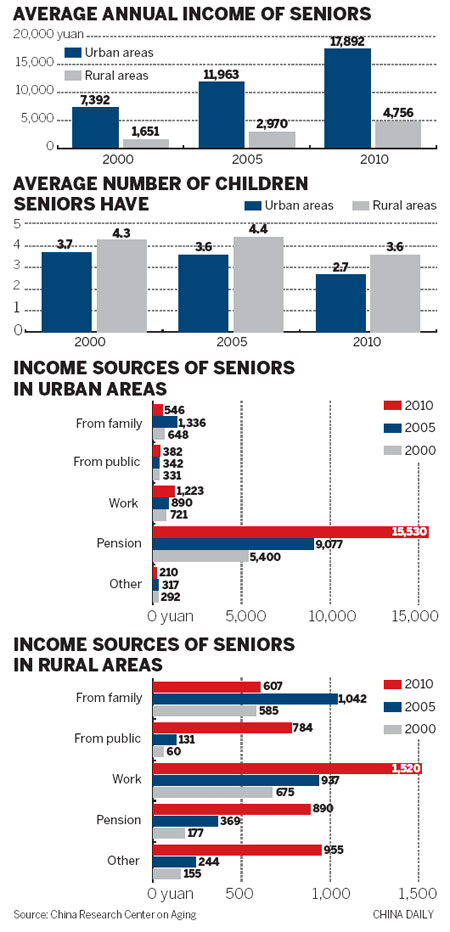

Seniors in China, especially those living in rural areas, require more financial support and nursing services from the government given shrinking family sizes, according to a survey released on Tuesday.
The survey, conducted by the China Research Center on Aging, said those over 60 years old had 3.2 children on average in 2010, down from four in 2000.
The survey that polled about 20,000 respondents aged over 60 nationwide in 2010 also showed that nearly half of the seniors live in "empty-nest" families with children far away.
In terms of financial wellbeing, the poll showed that the income gap between urban and rural areas remains large for seniors. Urbanites lived with an average income of 17,900 yuan ($2,800) per capita per year and saved about 2,000 yuan.
However, their rural counterparts could barely make ends meet with a yearly income of about 4,750 yuan - effectively the same as living expenses.
One in five seniors in cities described their economic situation as "difficult" or "extremely difficult", the survey said, yet two in five in rural areas felt the same way.
The pension system covered about 35 percent of the senior population in rural areas, compared with 85 percent in cities, the survey said.
More than 52 percent of seniors in the countryside continued working after they reached 60. However, only 0.5 percent of their urban counterparts did.
Zhou Qifeng, a 68-year-old villager in Xinyang city in Central China's Henan province, sweats about 10 hours a day to feed pigs, and plant herbs, vegetable and rice to support his wife and three grandchildren.
Zhou and his wife receive about 1,300 yuan every year from the government after they joined the New Rural Pension System and they earn 2,000 yuan more from selling herbs.
"Although the money we make is far from enough, we don't want to ask our children for money. We know it's not easy for them to make a living in big cities," said Zhou.
China was home to nearly 123 million people aged over 65 in 2011, according to the National Bureau of Statistics.
China's population is aging, with 13.7 percent of its population in 2011 older than 60, a rise of 0.4 percentage points compared with the previous year.
Supporting seniors in rural areas is and will continue to be a major challenge for Chinese society, said Fang Jiake, deputy director of Hetong Senior Citizens' Welfare Association, an NGO in Tianjin.
"Studies have shown that the rural population is aging faster than in urban China, and an estimated 60 percent of seniors live in rural areas," he said.
The social support system for seniors is yet to be established in rural areas, while tens of millions of left-behind seniors cannot rely on their migrant-worker children to take care of them, he said.
Guo Ping, an assistant research fellow from the China Research Center on Aging who participated in the survey, urged the government to improve the social security network for rural seniors.
"Currently, the government subsidy is too little to relieve the economic plight of rural seniors, but I believe the government will gradually enhance the insurance level," Guo said.
Three quarters of seniors said they suffered from chronic diseases and about 14 percent believe they need nursing services, the survey showed.
Only 11 percent of urban seniors said they want to spend the rest of their lives in nursing institutes, as did 12.5 percent of rural respondents.
Wu Yushao, vice-president of the China National Committee on Aging, said it is a global trend to facilitate home-based nursing services to enable healthy seniors to spend their lives in their original homes and communities.
hedan@chinadaily.com.cn


 Washington to remain focused on Asia-Pacific
Washington to remain focused on Asia-Pacific RQFII target blue chips amid bear market
RQFII target blue chips amid bear market Australian recall for top two exporters
Australian recall for top two exporters China fears new car restrictions
China fears new car restrictions